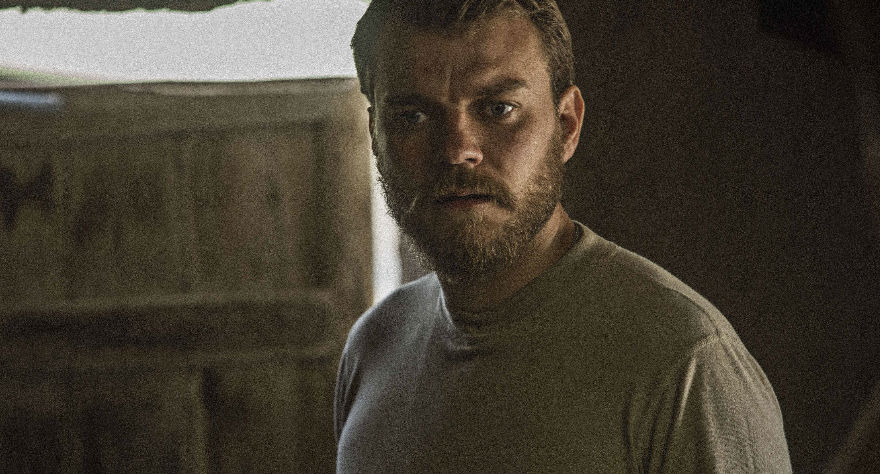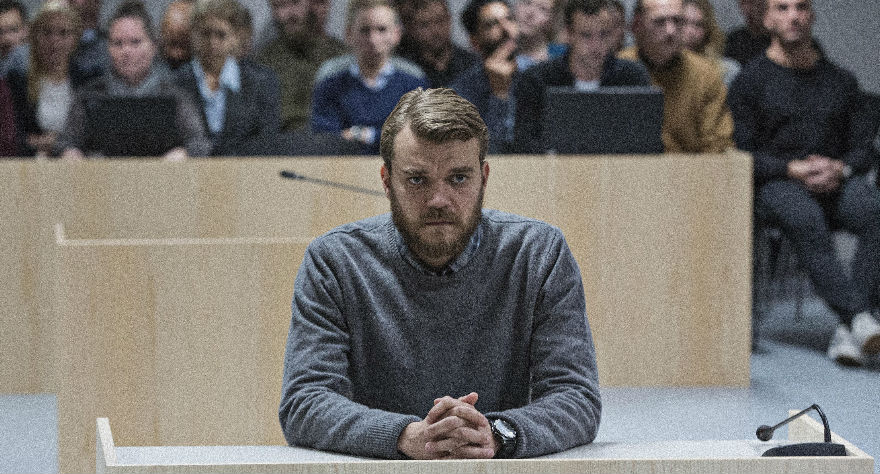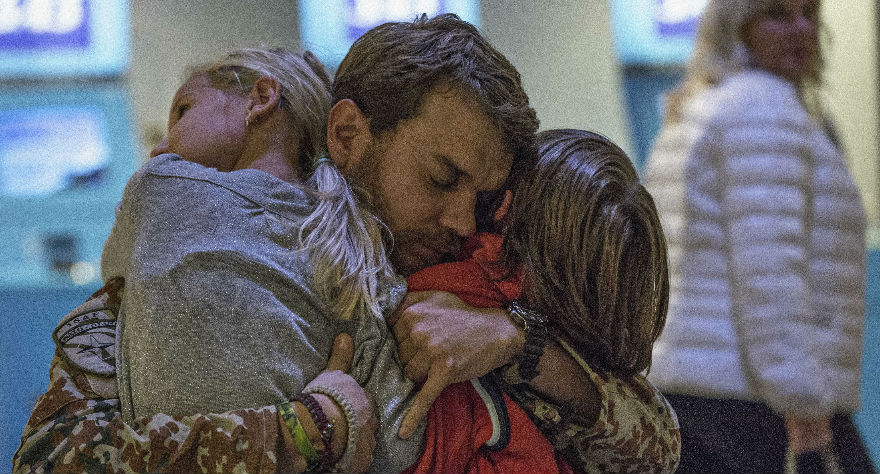Tobias Lindholm Talks ‘A War,’ The Pursuit of Human Truth In Storytelling

Out in theaters today is Danish director Tobias Lindholm’s (A Hijacking) latest film, A War, a humanistic exploration of the personal and psychological struggles of soldiers. Set in Denmark and Afghanistan, the film stars Pilou Asbæk as a company commander accused of committing a war crime under duress. The consequences of his actions in the field are felt not just by him, but by his wife and kids back home. War movie sensationalism is cast aside in favor of introspective complexity in this unique, exceptional take on a Hollywood genre that’s run cold as of late. Lindholm’s use of real veterans gives his film a layer of realism that heightens the drama in a powerful, sobering way.
I spoke to Lindholm about the film and his experience making it, which is out in theaters now.

There’s a lot of moral and emotional complexity to your movie. It’s a bit challenging in that way, and it’s also about war, which makes it even trickier to market to big audiences. That being said, how does it feel to be nominated for an Oscar? That recognition will obviously garner the film a considerable amount of attention and ensure an international audience.
I mean, we are enjoying every second of it. This movie started out with me writing the first word in a blank document, then reaching out and meeting all these Danish veterans that served in Afghanistan and meeting Afghan refugees. It was never the aim to have international success and actually be nominated for an Oscar and reach this large an audience. But nevertheless, we’re here now. For me to make those phone calls to the refugees, to the veterans, telling them, “You didn’t know whether I was going to do a good film or a bad film. You had no idea. But you all were loyal and shared bravely your experiences with me. To be able to share this with them is just amazing. A lot of the soldiers who were in the film are flying out here to party with me after the Oscars. That’s basically what I’m looking forward to. [laughs]
The film will be reaching a worldwide audience now with the Oscar recognition. But as you eluded to, the most important audience, perhaps, are the veterans who were brave enough to work with you on this movie and share their stories. What was it like screening the movie for them?
Oh, that’s always the most scary part, you know? I’ve made films now for ten years and I’m kind of getting used to the fact that it’s nerve-racking to know the critics are going to watch it and that the reviews are coming out and all that. But in this case it’s even harder because the witnesses are the men and women, the soldiers. To have them view it…I can’t describe how nervous [I was]. I was walking around for two hours not knowing where to go. Luckily, in this case, everybody was very pleased. We see now that the movie also translates well to the international veterans community. In that way, we feel great that we’ve been able to be loyal to the reality we’ve portrayed.
Most of the veterans I’ve met are very humble, almost shy to share their wartime stories. For you to find this group of soldiers who were so open about their experiences is incredible.
I never asked them any questions. I sat down and listened. When I start a conversation with one of these soldiers, I’d never ask, “How was it?” and so on. It’s technical questions, like “Why do you enter a compoound like that?” To get them speaking about it from a professional point of view. It’s their pride. They know this. They’ve rehearsed it so many times. By being loyal to that and wanting to understand I guess opened them up to understand that I was not there to be a parasite. I actually wanted to understand the reality. Slowly, when everybody starts to feel comfortable, they will start to share. Then it’s my job to be the editor and find the bits and pieces I can use. But I never sit down and ask emotional questions about the war. I know that if anyone came in and asked me about the most vulnerable place in me, I would shut down and not talk about it. If that’s where the conversation ends with them, that’s okay becasue I can use the technical stuff the film. How do you handle a gun? How do you talk to the locals? Understanding that will help me portray it.
I met the first soldier at a wedding and, as we know, magical things can happen when you’re a little drunk. Not too drunk, but just a little. At this wedding I had had a couple of drinks and I ended up at the bar with another man who had been in Iraq three times and once in Afghanistan. He just started to talk about how it was to be home and wanting to raise a family. He was the first generation of being a professional soldier in Denmark ever. That opened up a conversation we continued throughout the next few years. He invited in people he served with. Him giving approval to me helped the other guys open up as well.

I have a certain reverence and respect for soldiers when I’m around them. They’ve done things I can’t imagine. There must be a great pressure to tell their stories authentically but does that impede on the artistic process in any way? You are a storyteller with a vision at the end of the day.
The reason I do these stories, is because I want to show these stories we often see in the news from a human point of view. I don’t want to be political, I don’t want to be judgmental. I just want to understand what it is to be human in that situation. The film I did before this one is called A Hijacking, about Danish sailors being captured by Somali pirates. I don’t meet these people as me being a civilian and them being soldiers. Me being a civilian and them being heroes. I always just try to meet them as human beings and try to relate to what they’re going through. This is where we’re equal. I think this is the most important thing we can do as human beings. There are a lot of points where we’re different. All of us. But where we’re the same is the most important. That’s where the audience can relate to these guys. Even though it’s not comparable, I live a life as a filmmaker where I have to leave my kids and my wife for a long time sometimes to do my films. I know the feeling of not being able to connect with them on a proper phone line. Then I can chip in, and the soldiers will be able to relate to that. It’s not a consequence of being a soldier; it’s a consequence of being away from your family. My point of view as an artist is to make a film about human beings in a conflict instead of making a film about a conflict.
What’s unique about the Danish perspective on war?
The unique thing about our perspective on the war in Iraq and, in this case, Afghanistan, is that it’s the first war we’ve fought since the second World War. In the second World War, we fought for five hours and then gave up. As you can imagine, it has defined my generation in that we’re very new to this. In many ways, we are in a post-Vietnam phase in our country right now. We are not used to being a warfaring country yet. I guess that gives us a naive perspective of what’s going on. I still feel I need to confront stuff that a lot of other nations have accepted. I think the Danish perspective is that we’re new at this. We’re still learning. Therefore, we may be asking questions other nations have started to forget to ask.
There’s a pursuit of authentic truth in your productions. I like that you wanted to reference reality in your work, not other war movies. What are the benefits of this approach to storytelling?
There’s a contradiction here. I’m an educated screenwriter. I realized quite fast that I’m not amused by my own imagination. I find it boring. If I have to sit for two hours and make stuff up, I’m like, “I can’t do this.” But if I connect with the world, that’s interesting. I love to connect with these people. One of the big benefits is to share this and try to understand the world. It helps me on a personal level to constantly confront my perspective of the world. At the same time, you can say that, by sharing, this is not my project in the world but our project, all the people who have chipped in to make this film possible. I’m a team player. I’m a soccer player from childhood. I love to be on a team. I feel the most creative and most energized when I’m surrounded by people who want the same thing as me, whatever we’re doing.
This might be a little complex, but every human being in this world is trained from the day we are born and on to understand the world around us. We all enter new rooms every day. We all always spend a second when we meet a stranger to feel if this person is sad or angry or depressed or whatever. We don’t need any time to actually relate to other people. With moviemaking, it seems we think the audience has left that ability outside the cinema. We tell them all kinds of information to make them understand who we’re dealing with. I often get frustrated with being over-informed by all kinds of details about characters in films. I just want to watch a film where I can relate to people on a human level like I relate to people on a human level on the streets or in a restaurant. I remember watching the American documentary Restrepo and suddenly relating to these guys on a human level. I especially remember the scene where one of the soldiers has an anxiety attack because one of the other soldiers is shot and killed. In the middle of the firefight, he breaks down. For me, that’s proof of human life in war. I wanted to portray that and not just make references to other films. When I’m seeing explosions in war films, they’re always way too big. When I’m watching explosion
When I’m seeing explosions in war films, they’re always way too big. When I’m watching explosions from a helmet cam, I see a lot of dirt and sand in the air. And then silence. And then the screaming starts. The timing of reality is slightly different. I found it more interesting and more beneficial to try to approach the reality of it. I think our human ear and human eye is somehow educated to understand what is real and what is not real. I want to invite people into a natural portrayal of war instead of being another fascinated film about war.
